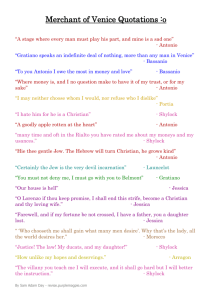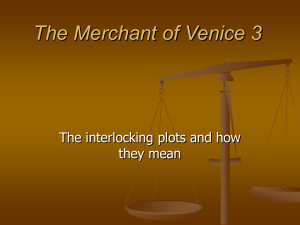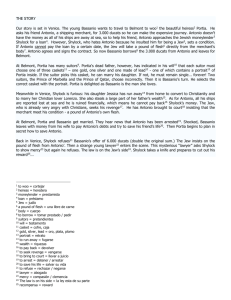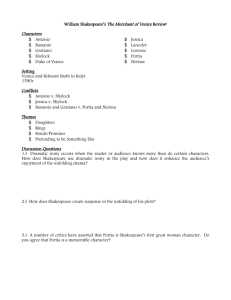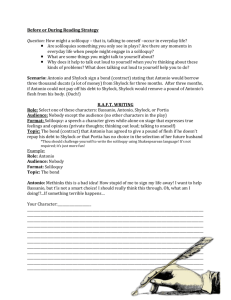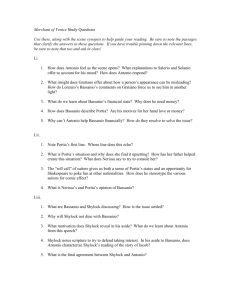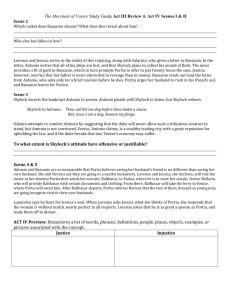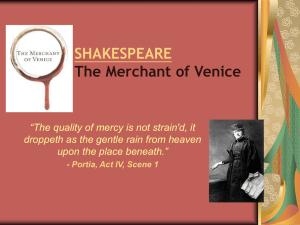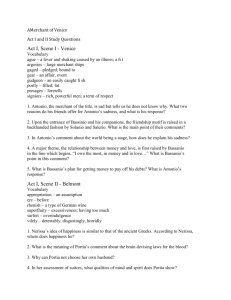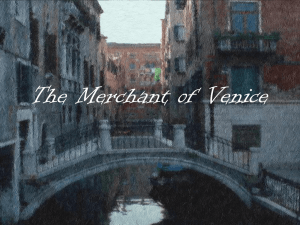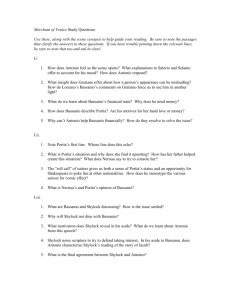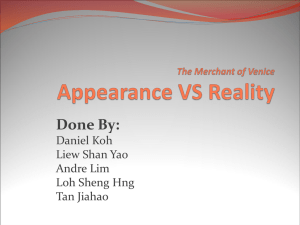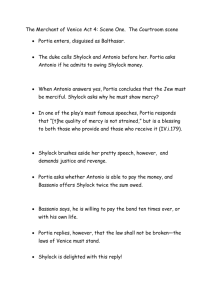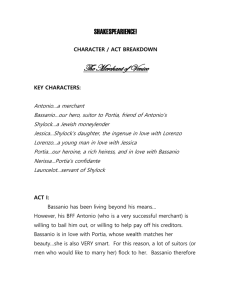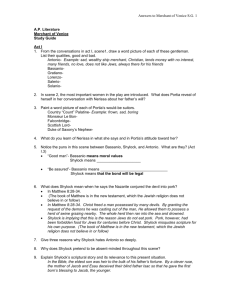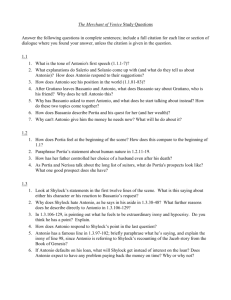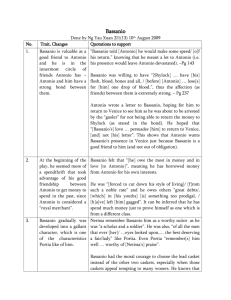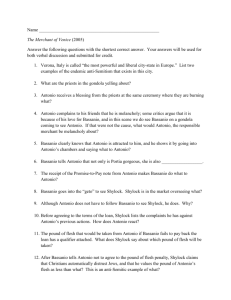Merchant of Venice Act IV
advertisement
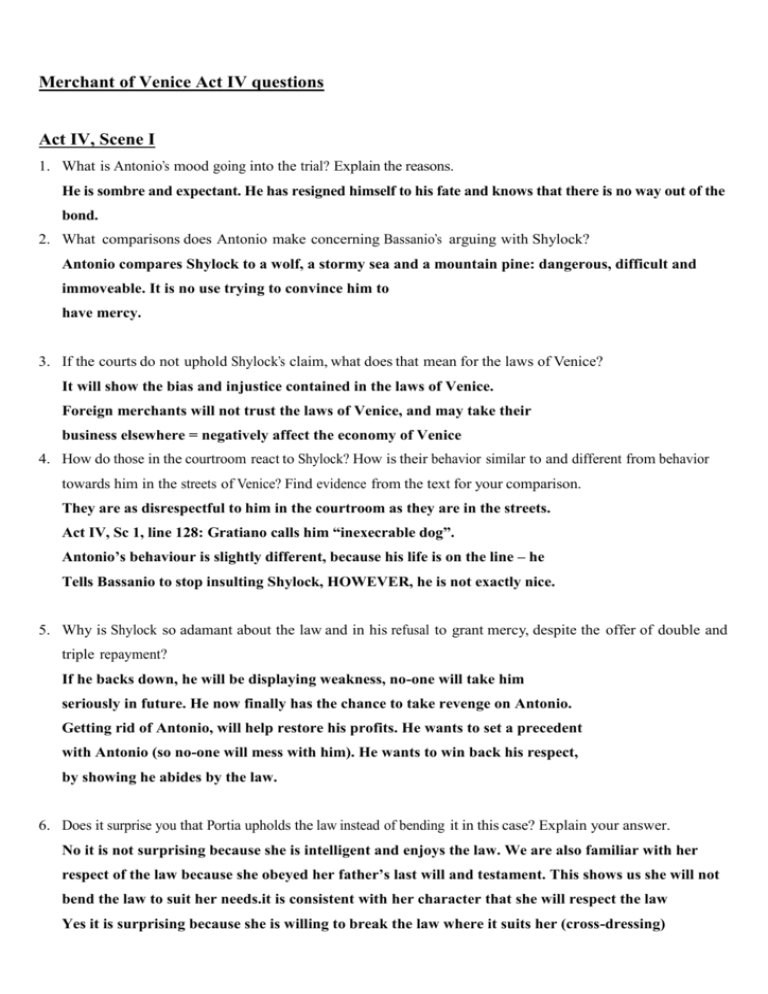
Merchant of Venice Act IV questions Act IV, Scene I 1. What is Antonio’s mood going into the trial? Explain the reasons. He is sombre and expectant. He has resigned himself to his fate and knows that there is no way out of the bond. 2. What comparisons does Antonio make concerning Bassanio’s arguing with Shylock? Antonio compares Shylock to a wolf, a stormy sea and a mountain pine: dangerous, difficult and immoveable. It is no use trying to convince him to have mercy. 3. If the courts do not uphold Shylock’s claim, what does that mean for the laws of Venice? It will show the bias and injustice contained in the laws of Venice. Foreign merchants will not trust the laws of Venice, and may take their business elsewhere = negatively affect the economy of Venice 4. How do those in the courtroom react to Shylock? How is their behavior similar to and different from behavior towards him in the streets of Venice? Find evidence from the text for your comparison. They are as disrespectful to him in the courtroom as they are in the streets. Act IV, Sc 1, line 128: Gratiano calls him “inexecrable dog”. Antonio’s behaviour is slightly different, because his life is on the line – he Tells Bassanio to stop insulting Shylock, HOWEVER, he is not exactly nice. 5. Why is Shylock so adamant about the law and in his refusal to grant mercy, despite the offer of double and triple repayment? If he backs down, he will be displaying weakness, no-one will take him seriously in future. He now finally has the chance to take revenge on Antonio. Getting rid of Antonio, will help restore his profits. He wants to set a precedent with Antonio (so no-one will mess with him). He wants to win back his respect, by showing he abides by the law. 6. Does it surprise you that Portia upholds the law instead of bending it in this case? Explain your answer. No it is not surprising because she is intelligent and enjoys the law. We are also familiar with her respect of the law because she obeyed her father’s last will and testament. This shows us she will not bend the law to suit her needs.it is consistent with her character that she will respect the law Yes it is surprising because she is willing to break the law where it suits her (cross-dressing) 7. How does Gratiano respond to the proceedings? He sarcastically comments every time Shylocks says something. He insults and defames Shylock. 8. Discuss the details surrounding how Portia saves Antonio’s life. Portia discovers that a foreigner may not shed a drop of a Christian Venetian’s blood, if they do they will receive death penalty. She also discovers that if a foreigner is found guilty of conspiring on the life a Venetian, he or she will have their assets seized and will be sentenced to death – only the Duke can then pardon them. 9. Before he gives his punishment, the Duke tells Shylock that he will “see the difference of our spirit” (l.367). What is the spirit of the Venetians, and by extension, Christians? Venetians offer mercy BUT the mercy they offer will never benefit the other party more than it benefits them. Their mercy is CONDITIONAL, and given under the guise of being a “Christian act” as opposed to a moral, ethical, decision. 10. What are Antonio’s conditions? Shylock will forfeit his money to Antonio and the Duke, giving Antonio full permission to do with it as he pleases. Shy6lock must leave his entire estate and will to Jessica and Lorenzo (a “gift”). He must also turn Christian. 11. Was this a fair trial? Explain. Own opinion. 12. What new insights do Portia and Nerissa have into their husbands’ natures as a result of this trial? They are kind and generous (willing to give away rings out of gratitude), but also harsh and unforgiving (their treatment of Shylock shows that they will not be easily manipulated into defeat). They feel that their husbands have shown bravery, but also foolishness and gullibility. 13. Shakespeare calls this play a comedy. How does the outcome of this trial help the play qualify? A comedy is qualified by the main character learning a lesson through a series of events. Antonio learns to never brag about money he does not yet possess; Bassanio and Gratiano learn to respect their wives and not be as gullible; Shylock learns that Christians will always come out on top in Venice. 14. Why would Portia ask Bassanio for the ring he had promised not to give away? To test his loyalty and willingness to obey her despite, being faced with a challenging proposition. 15. What excuse does Bassanio give the disguised Portia for not initially giving her his wedding ring? He tells her (Balthazar) that he is not willing to give her the ring as it is not worth much. 16. Discuss how Antonio manages to change Bassanio’s mind. He persuades Bassanio to give the ring, and tells him to value Antonio’s life (which Balthazar just saved) above Portia’s commandment. Act IV, Scene II 1. What does the fact that both Bassanio and Gratiano give their rings away say about relationships between men and relationships between men and women? Relationships between men were prized above all else. It was the epitome of Elizabethan love and respect to show loyalty to your friend. 2. What is Shakespeare’s intent in bringing in the ring plotline here? What purpose does it serve? The ring plotline is introduced at this point to remind us that MoV is a comedy, and although the trial is a very serious matter dealing with heavy themes, the ring plot is lighter and more nonsensical. It acts a comic relief. Merchant of Venice Act V questions Act V, Scene I 1. How does the dramatic shift in setting affect the tone of the play at this point? It moves from a serious, somber tone to something more light-hearted and feel-good. 2. Why does Shakespeare return us to Lorenzo and Jessica? Are they a good match? Explain your answer. Their match was opposed by Shylock, and is representative of how Christians and Jews can come together and love each other. They are also now free to be together as financially, their future has been secured by Shylock’s punishment. They are a good match in that they both hate Shylock, enjoy he company of the affluent, and are quite ambitious (jump at the chance of presiding over Portia’s house and holding court). 3. What effect does music have on the characters specifically, and on the scene in general? The music calms their spirit, as the trial with Shylock has ended and Antonio has emerged victorious. The music signifies that the battles have been won, and the characters are now free to live their live out of the shadow of Shylock. 4. Identify the tone in the argument about the ring (ll.192-208).How has Shakespeare molded the language to convey this tone? Portia mocks Bassanio’s way of speaking, by inverting his own questions back at him (her sentences are phrased the exact same way as his, using epistrophe). The argument is intended to be humorous, and Shakespeare molds the language (through use of epistrophe) to convey this. Epistrophe: using the same word at the end of successive sentences to emphasise a point. 5. How is this scene the comic inverse of the courtroom scene from IV, i.? Bassanio is now the one on trial (by Portia), but unlike the courtroom scene from Act IV, Portia will grant Bassanio mercy. Also, Bassanio is pleading for forgiveness (unlike Shylock). We as an audience know what is truly going on (dramatic irony). 6. The act starts in moonlight and ends as morning comes. Why? The move from the darkness to dawn is a itself a powerful symbol, representing the move from confusion, uncertainty, and loss to knowledge, faithfulness, and the restoration of fortune. Belmont is the light shining on the darkness of the sins of Venice. 7. Does this play have a “happily ever after” ending? Why or why not? What contributes to that feeling? What detracts from it? Yes and no – Portia and Bassanio receive a happy ending, as does Jessica and Lorenzo, Lancelot, and Gratiano and Nerissa. Antonio has gone through a tough ordeal and has learnt his lesson (in the tradition of a comedy). Shylock has his life, but is doomed to live the rest of his days in poverty, as a Christian. The fact that he does not appear again after the trial shows us that this was never meant to be “his” story, yet we as readers are not likely to forget his fate as soon as his punishers are. This is a comedy, but it is bittersweet
